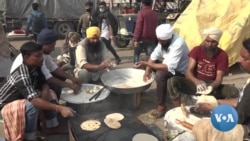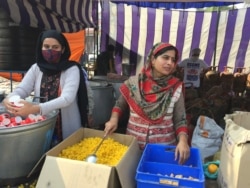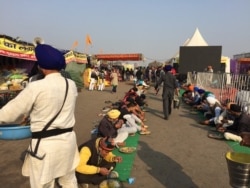Along a highway on the outskirts of New Delhi where thousands of protesting farmers have been camping for three weeks, scores of volunteers roll out Indian bread called “rotis,” stir vegetables in gigantic pots, brew tea and fry savories.
All through the day, makeshift kitchens that have sprung up on the roadside dish out hot meals to farmers who are demanding the roll back of new laws that liberalize rules for sale of farm produce to private companies.
“We have come fully equipped to prepare mass meals. The supplies come from our villages daily and we run the kitchen round the clock,” says Gurinder Singh, a Sikh farmer who has helped organize a community kitchen at one of the protest sites.
The staggering scale of cooking underway to sustain India’s biggest farm protest in decades is no surprise. Many of the farmers come from the northern Punjab state, where serving free, hot meals on a mass scale is an intrinsic tradition of the Sikh faith.
Called “langar,” and regularly served in their religious shrines, it is based on the principle of nourishing anyone in need, whether it is the homeless, victims of a natural disaster or protestors far away from home.
A religious minority in India, the food assistance provided by Sikhs is famous — most recently, they distributed hundreds of thousands of free meals to poor people who lost their livelihoods during the pandemic even during a strict lockdown.
Having grown up with the concept of “langar,” the volunteers say that rolling out hundreds of “rotis” and chopping and cooking heaps of vegetables is something that comes easily to them — it is customary for ordinary men and women to volunteer their services to prepare the community meals.
“In my village I go and assist in the “langar” every Sunday,” says Kala Singh, a farmer who has travelled from Punjab not just to support the protest, but also to ensure that the farmers don’t go hungry.
Another farmer, Jai Veer Singh, from Haryana says he began assisting his mother when he was 10 years old to prepare community meals that are organized after every harvest in his village, at festivals or in time of need. “This spirit of service is something we learnt from our home and our society. We have been taught to help where ever we go,” says Singh.
While men are at the forefront of the community kitchens, women have also been coming from villages to lend a hand.
The hot meals being handed out at the protest site are not restricted to the farmers — many poor people from the area also join the line.
Known as a symbol of equal treatment, the Sikh kitchens offer a plate to anyone who comes.
“Our inspiration is serving humanity, whether it is Hindus, Sikh, Muslim or Christian. We never see anybody’s religion,” says Gurinder Singh.
Supplies to sustain the impromptu, open air kitchens at the farmers protest are overflowing — tractors and trucks with sacks of vegetables and flour as well as cans of oil and milk arrive daily from villages and towns where pooling resources for community meals is a way of life.
Supporters of the farm protest often bring gifts such as almonds, apples, Indian sweets, or even packaged water. A Sikh shrine has sent a machine that rolls out hundreds of “rotis” every hour.
“My village has told me — continue the kitchens as long as needed. We will keep sending money and rations for four to five hundred people,” according to Jai Veer Singh.
That means a hot meal — usually lentils and a seasonal vegetable — is always at hand for the protestors. To wash it down, there are glasses of buttermilk or tea.
While camping on the roadside in the cold Delhi winter and spending nights curled up in tractor trailers poses a challenge, food presents no problem. “I have been here for two weeks. Just walk down the road and you will find a meal being served,” says farmer Ramesh Kumar as he strolls down the road.
The volunteers say these pots will sizzle as long as necessary for farmers to win their battle with the government. With no compromise in sight as the farm leaders turn down the concessions offered so far and insist that the new laws be scrapped, the kitchen fires on the highway are likely to be lit for some time.







